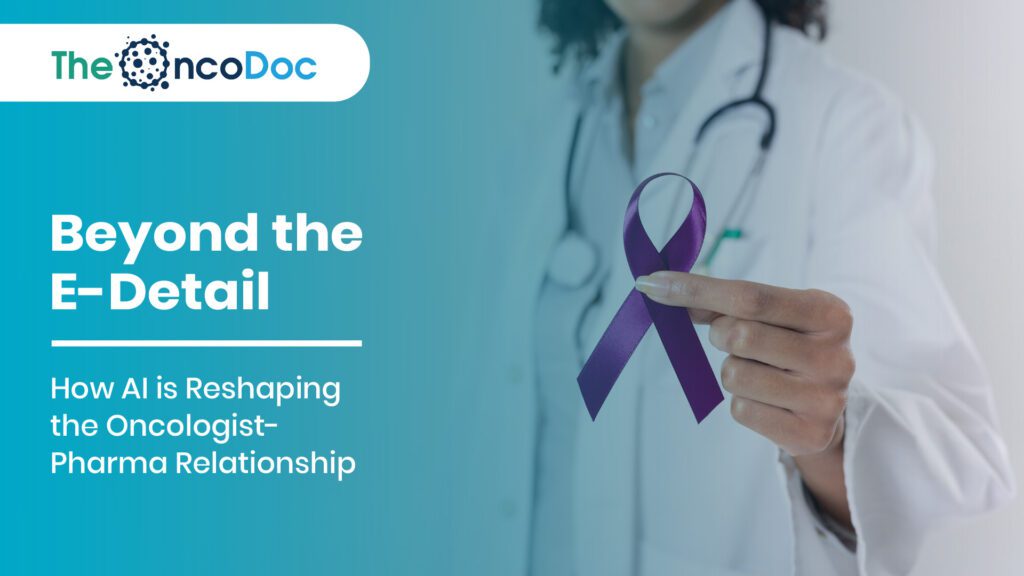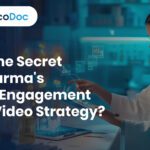Introduction: Moving Past Traditional Detailing
For decades, the oncologist-pharma relationship was built around in-person detailing sessions, clinical trial data sharing, and product-focused messaging. The e-detailing wave in the early 2000s digitized this exchange, but it remained transactional, structured around product knowledge rather than true collaboration. Today, with AI-powered insights, predictive engagement models, and digital empathy tools, the paradigm is shifting.
AI is no longer just a backend enabler; it is reshaping how pharma companies connect with oncologists, transforming interactions into value-driven partnerships. From intelligent content delivery to predictive patient insights, pharma brands are now moving beyond the e-detail towards a model that integrates science, technology, and trust.
This article explores transformative ways AI is redefining oncologist-pharma engagement, with real-world applications, strategies, and future implications.
1. From Product-Centric to Intelligence-Centric Engagement
Traditional detailing focused heavily on molecules, mechanisms, and efficacy. AI transforms this into intelligence-driven dialogue by analyzing oncologist behavior patterns, past interactions, and treatment preferences.
- Instead of repetitive brand messages, oncologists receive curated insights aligned to their clinical interest areas.
- AI models flag what content should be delivered at the right time, such as the latest trial update for a resistant tumor type.
This marks the transition from transactional information-sharing to collaborative intelligence-building.
2. Predictive Analytics for Oncologist Needs
AI-driven predictive engines anticipate oncologists’ content and data needs before they express them.
- If an oncologist is treating a rising number of lung cancer cases, the system pushes trial data, biomarker research, and regional patient registry insights.
- Pharma reps equipped with predictive dashboards can arrive with tailored solutions rather than generic slide decks.
This builds proactive engagement, positioning pharma as a trusted knowledge partner.
3. AI-Enabled Personalization of Scientific Content
Generic e-details often fail to resonate. AI personalizes content to oncologists’ subspecialty, research interest, and case load.
- A breast cancer specialist receives targeted updates on HER2-low therapies.
- A hematologist is served dynamic infographics on CAR-T advancements.
- AI curates micro-content formats, infographics, videos, abstracts, based on preferred consumption style.
This ensures oncologists receive precisely relevant content, reducing cognitive overload.
4. The Evolution of the Pharma Rep: AI-Augmented Partner
Pharma reps are no longer mere presenters of drug data. With AI, they become relationship managers empowered by insights.
- AI virtual assistants prepare pre-call briefs highlighting oncologist priorities, prescribing behaviors, and patient population trends.
- Reps can steer discussions towards solutions, not sales, backed by predictive recommendations.
This human-AI collaboration strengthens trust and repositions pharma reps as clinical allies.
5. Hyperlocal Oncology Intelligence
Cancer incidence and treatment vary significantly by geography. AI leverages epidemiological data, screening trends, and hospital analytics to create hyperlocal insights for oncologists.
- Oncologists in tier-2 cities may receive regional oral cancer trends.
- Urban oncologists might see updates on biomarker testing gaps.

This hyperlocal customization ensures relevance and deeper engagement.
6. AI-Powered Clinical Decision Support
Pharma’s role expands from drug provider to clinical advisor. AI-powered dashboards offer oncologists:
- Treatment pathway simulations based on patient profiles.
- Real-world evidence comparisons of drug outcomes.
- AI-augmented toxicity management insights.
Pharma brands offering these tools become strategic partners in clinical decision-making, not just suppliers.
7. Emotional AI in Oncologist Engagement
AI doesn’t just deliver data, it also measures emotional response during interactions.
- Sentiment analysis of oncologist emails or webinar feedback reveals emotional resonance.
- Engagement strategies adapt, shifting tone from data-heavy to empathetic when needed.
This helps pharma foster emotional alignment and empathy, critical in oncology’s high-stakes environment.
8. Optimizing Multichannel Touchpoints with AI
Oncologists engage across multiple touchpoints, emails, webinars, WhatsApp groups, conferences. AI ensures orchestrated, non-redundant messaging:
- Avoids duplicate outreach across channels.
- Maps the most effective engagement path for each oncologist.
- Ensures seamless handoff between digital and in-person interactions.
This prevents engagement fatigue and maximizes value.
9. AI-Driven Scientific Exchange Platforms
Pharma is creating AI-moderated discussion forums where oncologists access peer insights in real time.
- AI highlights trending clinical debates.
- Auto-summarizes long threads into digestible key points.
- Identifies knowledge gaps and pushes relevant research papers.
Such platforms elevate pharma’s role as a facilitator of peer learning.
10. AI for Clinical Trial Awareness
Oncologists often lack real-time knowledge about active clinical trials. AI solves this by:
- Mapping trial eligibility with oncologists’ current patient pools.
- Sending trial alerts for rare cancers.
- Offering multilingual, simplified trial summaries.

AI-driven trial matching reduces these barriers, boosting patient access to cutting-edge therapies.
11. Building Trust through Transparency Dashboards
Oncologists increasingly demand transparency in pharma interactions. AI-powered dashboards offer:
- Real-time trial data updates.
- Transparent side-effect reporting based on real-world evidence.
- Cost-effectiveness analyses compared with standard of care.
This openness fosters credibility and ethical trust.
12. Conversational AI as Knowledge Partners
ChatGPT-like conversational platforms allow oncologists to:
- Query new data in natural language.
- Access instant summaries of clinical guidelines.
- Receive multilingual patient explanation scripts.
Pharma brands that embed conversational AI into oncologist workflows ensure always-available, context-relevant knowledge.
13. Shifting from Push to Predictive Pull Marketing
Rather than pushing static content, AI predicts oncologist intent and enables self-driven exploration.
- If oncologists search for “resistant breast cancer therapies,” pharma platforms proactively surface new trial insights.
- Predictive pull marketing creates autonomy and trust, avoiding the perception of aggressive promotion.
14. AI in Real-World Evidence Sharing
Oncologists value RWE over trial-only data. AI synthesizes patient registries, electronic health records, and claims data to present:
- Real-world survival outcomes.
- Adherence and quality-of-life data.
- Comparative analysis across subpopulations.
This transforms pharma into a real-world insights partner, critical for informed clinical decisions.
15. AI-Powered CME Personalization
Continuing Medical Education (CME) is central to oncologist learning. AI makes CME highly personalized:
- Tailors topics to oncologist specialty and case exposure.
- Predicts preferred format, live webinars, podcasts, or WhatsApp modules.
- Measures learning outcomes via adaptive assessments.

AI ensures CME programs are not just box-ticking exercises but deep learning opportunities.
16. Integration with Wearables and Digital Tools
Pharma is enabling oncologists to access AI-analyzed data from wearables:
- Remote monitoring of patient vitals.
- Early flagging of toxicity signals.
- Integration into treatment dashboards.
This bridges the oncologist-patient-pharma loop, reinforcing pharma’s clinical value.
17. AI-Enhanced Advisory Boards
Traditional advisory boards are episodic. AI transforms them into continuous engagement ecosystems:
- Aggregates oncologist feedback in real time.
- Identifies consensus and divergence on therapy protocols.
- Creates dynamic insights for pipeline shaping.
This keeps oncologists continuously engaged in shaping pharma strategy.
18. Social Listening for Oncologist Needs
Oncologists share opinions across conferences, journals, and digital forums. AI-powered social listening:
- Tracks trending concerns among oncology communities.
- Detects misinformation in professional spaces.
- Pushes pharma content aligned to real-time discourse.
This ensures pharma is always contextually relevant in oncologist conversations.
19. Ethical Guardrails in AI Engagement
Trust is fragile in oncology. AI-driven engagement must respect ethical boundaries:
- Clear consent for AI-based profiling.
- No manipulation of prescribing behavior.
- Transparent data sourcing.
Ethical AI fosters long-term relationship sustainability.
20. AI-Powered Precision Medical Affairs
Medical affairs teams are evolving into data-driven scientific advisors. AI enables them to:
- Track oncologist queries across platforms to anticipate educational needs.
- Generate tailored literature summaries for rare cancers.
- Predict which oncologists are most likely to seek guidance on new indications.
Instead of waiting for outreach, AI ensures medical affairs is always ahead of oncologists’ knowledge curve, delivering timely, precise value.
21. Generative AI for Research Insights
Oncologists are inundated with new studies daily, and generative AI simplifies this research overload by delivering precise, actionable insights.
- It can condense large volumes of abstracts into concise summaries that highlight key clinical takeaways.
- It converts complex molecular or genomic data into clear statements that directly relate to treatment decisions.
- It enables trial comparisons and “what-if” modeling, helping oncologists assess real-world applicability.
By filtering noise and presenting only relevant intelligence, generative AI ensures oncologists stay informed without fatigue, making knowledge consumption both efficient and clinically meaningful.
22. Predictive Patient Journey Mapping
Oncology care extends far beyond initial diagnosis, and AI plays a critical role in understanding the complete patient journey, from detection to survivorship. AI-driven journey mapping equips oncologists with forward-looking insights that improve both continuity and quality of care.
- It identifies cohorts at higher risk of treatment non-adherence, enabling early counseling or digital reminders.
- It pinpoints crucial intervention moments, such as nutrition or psychological support, that can improve long-term outcomes.
- It issues predictive alerts on potential follow-up drop-offs, helping oncologists re-engage patients before critical care gaps occur.
By merging predictive insights with real-world patient behaviors, pharma evolves into a strategic partner for sustained cancer management, strengthening relationships with oncologists well beyond therapy initiation.
23. Voice AI for Clinical Efficiency
With heavy caseloads and limited time, oncologists require tools that simplify workflows and reduce administrative burdens. Voice AI technologies are emerging as powerful clinical assistants that enhance efficiency and accuracy.
- Smart transcription tools capture and update patient interactions directly into EHRs, saving valuable consultation time.
- Voice-enabled queries such as “What’s the latest trial on KRAS-mutated lung cancer?” provide instant, evidence-based results.
- Automated multilingual scripts generate patient education content in local languages, improving communication and trust.
By replacing static detailing with dynamic, interactive support, voice AI positions pharma as a real-time clinical partner, helping oncologists focus on patient care instead of paperwork.
24. AI-Driven Peer Benchmarking Tools
Oncologists consistently seek ways to evaluate their practice standards against peers while ensuring patient safety and innovation. AI-enabled benchmarking platforms from pharma provide this opportunity in a structured, confidential manner.
- They compare prescribing trends across hospitals and regions, offering valuable context on therapeutic choices.
- They reveal differences in biomarker adoption and diagnostic utilization, highlighting areas of improvement.
- They surface best practices and innovative approaches without exposing personal identifiers or breaching ethical boundaries.
By enabling this transparent peer-to-peer comparison, pharma helps foster collaborative learning and clinical refinement. The shift positions pharma not as a promoter but as a trusted knowledge facilitator, building credibility and long-term engagement with oncologists.
peer learning, reinforcing pharma’s role as a neutral insights facilitator rather than a promoter.
25. AI for Continuous Pharmacovigilance Collaboration
Safety is paramount in oncology. AI enables real-time pharmacovigilance support:
- Detects early safety signals from patient EHRs and adverse event reports.
- Provides oncologists with localized safety dashboards comparing drug profiles.
- Alerts both pharma and clinicians to emerging toxicity trends.
By enabling shared vigilance, pharma fosters a safety-first culture that enhances oncologist confidence.
26. The Future: Collaborative AI Ecosystems
The next frontier of oncology engagement lies in collaborative AI ecosystems, where pharma, oncologists, patients, and policymakers join forces to deliver holistic cancer care. Unlike isolated detailing, this model thrives on shared intelligence and continuous collaboration.
- Predictive AI identifies emerging cancer hotspots and informs public health strategies.
- Digital twin models replicate patient biology to forecast therapy outcomes and guide personalized treatments.
- Integrated campaigns combine pharma’s scientific resources with oncologist insights and patient group advocacy for maximum impact.
In this vision, pharma is no longer viewed as a product supplier but as a strategic orchestrator of collective intelligence, driving innovations that shape oncology’s future.
Conclusion: The Age of Intelligent Collaboration
The oncologist-pharma relationship has evolved from face-to-face detail calls to e-details, and now into AI-augmented partnerships. No longer defined by product promotion, this relationship is built on knowledge, foresight, and empathy.
From predictive analytics to emotional AI, from trial-matching engines to pharmacovigilance dashboards, AI is dismantling silos and creating precision engagement at scale. Each interaction now has the potential to become a clinical catalyst, driving improved patient outcomes while deepening trust.
As we move into the future, pharma brands that embrace AI not merely as a tool but as a collaborative bridge will redefine their relevance. The winning formula lies in ethical intelligence, hyper-personalized engagement, and transparent partnerships. Beyond the e-detail, the oncologist-pharma relationship is no longer about transactions, it is about transformations that save lives.
The Oncodoc team is a group of passionate healthcare and marketing professionals dedicated to delivering accurate, engaging, and impactful content. With expertise across medical research, digital strategy, and clinical communication, the team focuses on empowering healthcare professionals and patients alike. Through evidence-based insights and innovative storytelling, Hidoc aims to bridge the gap between medicine and digital engagement, promoting wellness and informed decision-making.



